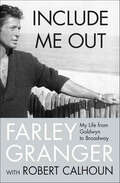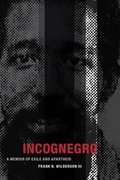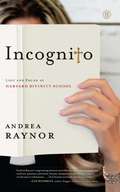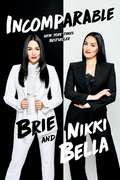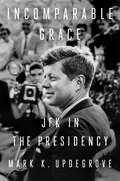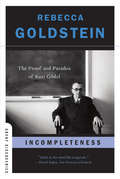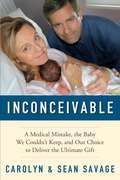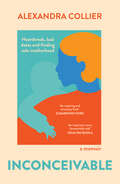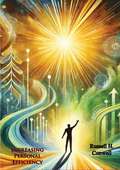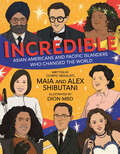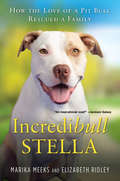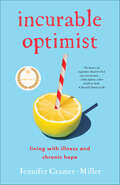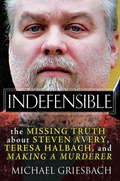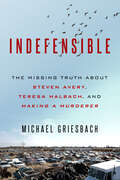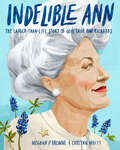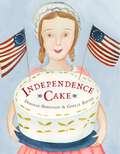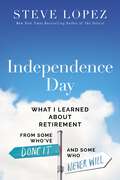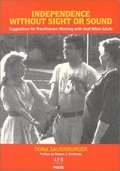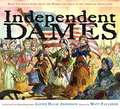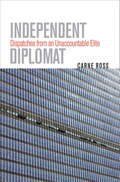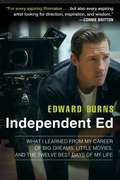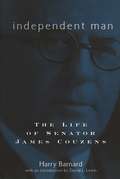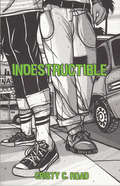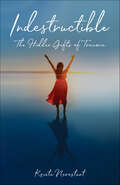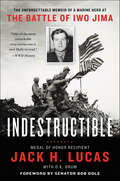- Table View
- List View
Include Me Out: My Life from Goldwyn to Broadway
by Farley Granger Robert CalhounThe star of Hitchcock’s Rope and Strangers on a Train “recalls life onstage and in film in an engaging, colorful memoir” (Kirkus Reviews, starred review).Synonymous with the golden age of Broadway, the dazzling lights of Hollywood, and the rise of television arts, Farley Granger’s charm and talent captivated the acting community and audiences alike. Working with creative visionaries like Alfred Hitchcock, Luchino Visconti, and Nick Ray, Granger was a celebrated figure in films like Strangers on a Train, Rope, Senso, and They Live by Night, bringing to the big screen a stunningly memorable presence.But behind his characters, he was an intensely complex man. In his richly told memoir, Granger details his life with disarming candor. Rich in personal insight, he describes his relationships with both men and women and reminisces about legends he knew with private familiarity—from Shelley Winters and Joan Crawford to Leonard Bernstein and Tyrone Power.Recreating not only his personal struggles but his legendary struggle to free himself of his contract with Sam Goldwyn, Granger reveals none so elegantly as he does himself. Include Me Out is as much a story of classic Hollywood glamour as it is a collection of iconic theatrical portraits, all from the man who knew them all.“This polished and perceptive memoir etches a scintillating portrait of life inside Tinseltown soundstages where ‘nothing was real except anxiety, insecurity and fear’ . . . The book has a huge celebrity cast, from Mike Todd, Rita Hayworth and Cornelia Otis Skinner to Leonard Bernstein and Peggy Guggenheim. Granger and Calhoun write with a stylish and iridescent flair.” —Publishers Weekly
Incognegro: A Memoir of Exile and Apartheid
by Frank B. Wilderson IIIIn 1995, a South African journalist informed Frank Wilderson, one of only two American members of the African National Congress (ANC), that President Nelson Mandela considered him "a threat to national security." Wilderson was asked to comment. Incognegro is that "comment." It is also his response to a question posed five years later in a California university classroom: "How come you came back?" Although Wilderson recollects his turbulent life as an expatriate during the furious last gasps of apartheid, Incognegro is at heart a quintessentially American story. During South Africa's transition, Wilderson taught at universities in Johannesburg and Soweto by day. By night, he helped the ANC coordinate clandestine propaganda, launch psychological warfare, and more. In this mesmerizing political memoir, Wilderson's lyrical prose flows from unspeakable dilemmas in the red dust and ruin of South Africa to his return to political battles raging quietly on US campuses and in his intimate life. Readers will find themselves suddenly overtaken by the subtle but resolute force of Wilderson's biting wit, rare vulnerability, and insistence on bearing witness to history no matter the cost.
Incognito: Lost and Found at Harvard Divinity School
by Andrea RaynorFilled with humor, insight, and faith, this true story tells how one woman overcame challenges, stereotypes, and personal struggles at Harvard Divinity School and emerged an ordained minister. As a bright young girl from Ohio, Andrea Raynor always wanted to be a doctor. Instead, she landed-- almost by accident--at Harvard Divinity School, which, she quickly discovered, was no typical seminary. When she attended, in the 1980s, HDS was a place overflowing with creative expression and freedom of thought. Her classmates included two men who were undergoing sex changes and a woman who fancied herself a geisha. There was a lively gay and lesbian caucus, marches on Washington, civil disobedience, and more sexual intrigue than could be found in a stereotypical college fraternity house. Providing a bird's-eye view of life within the hallowed halls (and beneath the crimson robes), Incognito is a humorous and poignant glimpse inside one of the nation's most revered institutions. It begins with the long drive from Ohio to Cambridge and ends at the bedside of a dying young woman. But the real story is about the challenges, surprises, and ultimately life-changing experiences Andrea faced on the road to understanding God's call for her life. From navigating relationships to exploring whether a pretty girl can truly wear a collar, Incognito tackles our assumptions about spirituality, the church, morality, and identity, and affirms that God often works in ways--and in people--we least expect.
Incomparable
by Brie Bella Nikki BellaTHE INSTANT NEW YORK TIMES BESTSELLER A raw, honest, and revealing co-memoir by Brie and Nikki Bella: twin sisters, WWE Hall of Fame inductees, and stars of the hit E! shows Total Bellas and Total Divas.As twins, the Bellas have always competed. Legend has it that Nikki drop-kicked Brie in the womb so that she could make her grand entrance first. But the rest of the world often treated them as identical and even interchangeable, so they decided to do something about it. After they made it into WWE, the Bellas accomplished so much together: bringing in young girls and women while building the Bella Army, helping the transition of female performers from Divas to Superstars, starring in Total Divas and Total Bellas, and founding companies like Birdiebee, Nicole + Brizee Beauty, and Bonita Bonita Wine. Though their early journey began with loss, abuse, and plenty of rough times, these challenges &“shined the diamond.&” They resolved to be survivors and the heroes of their own stories, and to take control and responsibility for their lives. Eventually, they would come to show girls everywhere that they can do anything. The Bellas may be identical twins—but as individuals, they have proven themselves Incomparable.
Incomparable Grace: JFK in the Presidency
by Mark K. UpdegroveAcclaimed author and historian Mark K. Updegrove, head of the LBJ Foundation and presidential historian for ABC News, offers an illuminating account of John F. Kennedy&’s brief but transformative tenure in the White House. &“Tremendously absorbing and inviting… An important book.&”—Doris Kearns Goodwin • &“Elegant, concise, [and] knowing.&”—Michael Beschloss • &“Rescues JFK from Camelot mythology.&”—Richard Norton Smith Nearly sixty years after his death, JFK still holds an outsize place in the American imagination. While Baby Boomers remember his dazzling presence as president, millennials more likely know him from advertisements for Omega watches or Ray Ban sunglasses. Yet his years in office were marked by more than his style and elegance. His presidency is a story of a fledgling leader forced to meet unprecedented challenges, and to rise above missteps to lead his nation into a new and hopeful era. Kennedy entered office inexperienced but alluring, his reputation more given by an enamored public than earned through achievement. In this gripping new assessment of his time in the Oval Office, Updegrove reveals how JFK&’s first months were marred by setbacks: the botched Bay of Pigs invasions, a disastrous summit with the Soviet premier, and a mismanaged approach to the Civil Rights movement. But the young president soon proved that behind the glamour was a leader of uncommon fortitude and vision. A humbled Kennedy conceded his mistakes, and, importantly for our times, drew important lessons from his failures that he used to right wrongs and move forward undaunted. Indeed, Kennedy grew as president, radiating greater possibility as he coolly faced a steady stream of crises before his tragic end. Incomparable Grace compellingly reexamines the dramatic, consequential White House years of a flawed but gifted leader too often defined by the Camelot myth that came after his untimely death.
Incompleteness: The Proof and Paradox of Kurt Gödel (Great Discoveries)
by Rebecca Goldstein"A gem. . . . An unforgettable account of one of the great moments in the history of human thought." --Steven Pinker Probing the life and work of Kurt Gödel, Incompleteness indelibly portrays the tortured genius whose vision rocked the stability of mathematical reasoning-- and brought him to the edge of madness.
Inconceivable
by Carolyn Savage Sean SavageA medical mistake during an IVF procedure. An unthinkable situation . . . you're pregnant with the wrong baby. You can terminate, but you can't keep him. What choice would you make? Carolyn and Sean Savage had been trying to expand their family for years. When they underwent an IVF transfer in February 2009, they knew it would be their last chance. If they became pregnant, they would celebrate the baby as an answer to their prayers. If not, they would be grateful for the family they had and leave their fertility struggles behind forever. They never imagined a third option. The pregnancy test was positive, but the clinic had transferred the wrong embryos. Carolyn was pregnant with someone else's baby. The Savages faced a series of heartbreaking decisions: terminate the pregnancy, sue for custody, or hand over the infant to his genetic parents upon delivery. Knowing that Carolyn was carrying another couple's hope for a baby, the Savages wanted to do what they prayed the other family would do for them if the situation was reversed. Sean and Carolyn Savage decided to give the ultimate gift, the gift of life, to a family they didn't know, no strings attached. Inconceivable provides an inside look at how modern medicine, which creates miracles daily, could allow such a tragic mistake, and the many legal ramifications that ensued with both the genetic family and the clinic. Chronicling their tumultuous pregnancy and its aftermath, which tested the Savage's faith, their relationship to their church, and their marriage, Inconceivable is ultimately a testament to love. Carolyn and Sean loved this baby, making it impossible for them to imagine how they could give him life and then give him away. In the end, Inconceivable is a story of what it is to be a parent, someone who nurtures a life, protects a soul, only to release that child into the world long before you're ready to let him go.
Inconceivable: Heartbreak, bad dates and finding solo motherhood
by Alexandra CollierAlexandra Collier was a writer living in a light-filled Brooklyn brownstone in New York with the man she loved. But when she woke up to a ravenous hunger to have a baby that her partner didn't share, she had to make a choice between love or a future family. She chose family, which catapulted her life back to Melbourne where, at 37, she found herself single, heartbroken and living with her parents. Ally began dating with dedication with sometimes hilarious and often soul-crushing results. But like many single women approaching 40, she found that her reproductive timeline was rapidly outpacing her romantic life. So she began to explore another controversial option: conceiving a baby with donor sperm. From defying her family's expectations to searching for sperm and navigating pregnancy alone, Ally deftly takes us through the ecstatic, complicated and demanding path to becoming a solo mother by choice. 'An inspiring and necessary book that challenges the narratives we set for our lives and reveals the beauty beyond them' CLEMENTINE FORD'Powerful, singular story I rejoiced in reading. Finally, here is a story about a woman who has created her own happily ever after, without submitting to traditional forms of family-building. Collier writes movingly of the judgement single women face in society. Necessary, immersive read.' JESSIE TU
Increasing Personal Efficiency
by Russell H. ConwellIn "Increasing Personal Efficiency," Russell H. Conwell, the esteemed Baptist minister, lawyer, and founder of Temple University, provides a comprehensive guide to maximizing productivity and achieving personal success. Drawing on his extensive experience and keen insights, Conwell offers practical advice and motivational wisdom to help individuals enhance their efficiency in both their personal and professional lives.Conwell's approach to personal efficiency is holistic, emphasizing the importance of mental, physical, and spiritual well-being. He believes that true efficiency arises from a balanced and well-rounded lifestyle that nurtures all aspects of an individual's character and abilities.Key themes include:Time Management: Conwell offers strategies for effective time management, emphasizing the importance of prioritizing tasks, setting realistic goals, and avoiding procrastination. He provides practical tips on how to organize one's day to maximize productivity and achieve a healthy work-life balance.Goal Setting: The book underscores the importance of setting clear, achievable goals. Conwell encourages readers to define their objectives and create actionable plans to reach them, highlighting the role of persistence and determination in achieving success.Self-Discipline: Conwell discusses the vital role of self-discipline in increasing personal efficiency. He provides techniques for developing and maintaining discipline, including habits of regular practice, focus, and resilience.Physical Health: Recognizing the connection between physical health and efficiency, Conwell advises on maintaining a healthy lifestyle through proper nutrition, regular exercise, and adequate rest. He believes that a strong, healthy body contributes significantly to one's overall efficiency and effectiveness.Mental Attitude: Conwell explores the power of positive thinking and a proactive mindset. He encourages readers to cultivate a positive attitude, embrace challenges, and learn from failures as part of their journey toward personal growth and efficiency.
Incredible: Asian Americans and Pacific Islanders Who Changed the World
by Maia Shibutani Alex ShibutaniOlympians Alex and Maia Shibutani continue their Amazing exploration of more than thirty extraordinary Asian Americans, Native Hawaiians, and Pacific Islanders who have changed the world in this gorgeous and inclusive picture book.This companion book to Amazing delves further into the vast number of Asian Americans, Native Hawaiians, and Pacific Islanders who have made significant and lasting change in the world, including groundbreaking journalist Connie Chung, first Asian American Congressman Dalip Singh Saund, and renowned singer/activist Israel Kaʻanoʻi Kamakawiwoʻole.Maia and Alex Shibutani have taken their Olympic-medal-winning drive and passion to amplify AANHPI contributions and successes for a more inclusive world. Together with artist Dion MBD, they introduce more than thirty figures, ranging from chefs to entertainers to scientists, in short but substantial biographies and colorful illustrations. Their hope is that young readers will learn that these heroes have shaped our lives in countless inspiring ways.
Incredibull Stella: How the Love of a Pit Bull Rescued a Family
by Elizabeth Ridley Marika MeeksGET READY TO FALL IN LOVE WITH ONE INCREDIBLE DOG … Marika Meeks fell in love with Stella the moment she saw her. The adorable pit bull puppy had been abandoned in a cold field in winter—but her warm, friendly eyes and boundless affection could melt anyone’s heart. Even so, Marika wasn’t sure she was ready to adopt a dog. As a busy entrepreneur, wife, and mother of two daughters, Marika’s life was crazy already. She was recovering from stage-three breast cancer, and her family was still reeling from her brush with mortality. But Marika couldn’t deny the way Stella made her feel—the pure joy of this sweet-natured dog’s unconditional love—and she knew in her heart what her family needed … In a leap of faith, the Meekses welcomed Stella into their home, and thanks to this incredible dog, the daily pressures of work, stress, and Marika’s health problems seemed to slip away. As Marika’s cancer receded and her family found renewed vitality, she began sharing Stella’s story with the world. Now an international social media star, Stella helps Marika to spread their heartfelt message of advocating for pit bull breed awareness, explaining the benefits of pet ownership, and supporting shelters and other organizations that save animals’ lives. If you’ve ever experienced the joy that only an animal can bring—or felt the healing power of a pet’s unconditional love—you’re going to adore Incredibull Stella.
Incurable Optimist: Living with Illness and Chronic Hope
by Jennifer Cramer-Miller2024 International Impact Book Awards Winner: Family and Medical Book of Excellence Award Winner: Family Publishers Weekly, starred review, PW Book of the Week, August 2023 At twenty-two, Jennifer Cramer-Miller was thrilled with her new job, charming boyfriend, and Seattle apartment. Then she received a devastating autoimmune diagnosis—and suddenly, rather than planning for a bright future, she found herself soaking a hospital pillow with tears and grappling with words like “progressive” and “incurable.” That day, Cramer-Miller unwillingly crossed over from wellness to chronic illness—from thriving to kidney failure. Her chances of survival hinged upon on the expertise of doctors, the generosity of strangers, and the benevolence of loved ones. But what kind of life would that be? Spanning two-plus decades, this family love story explores loss and acceptance, moving forward with uncertainty, and forging a path to joy. Four kidney transplants later, Cramer-Miller is here to shine a bright light on people helping people in difficult times with a story that will make you want to hug the humans you love. Because sometimes it’s the sorrows that threaten to pull us apart that ultimately unite us in hope.
Indefensible: The Missing Truth about Steven Avery, Teresa Halbach, and Making a Murderer
by Michael GriesbachAn insider exposes the shocking facts deliberately left out of the hit Netflix series Making a Murderer--and argues persuasively that Steven Avery was rightfully convicted in the 2005 killing of Teresa Halbach. After serving eighteen years for a crime he didn't commit, Steven Avery was freed--and filed a thirty-six-million-dollar lawsuit against Manitowoc County, Wisconsin. But before the suit could be settled, Avery was arrested again--this time for the brutal murder of Teresa Halbach--and, through the office of a special prosecutor, convicted once more. When the saga exploded onto the public consciousness with the airing of Making a Murderer, Michael Griesbach, a prosecutor and member of Wisconsin's Innocence Project who had been instrumental in Avery's 2003 exoneration, was targeted on social media, threatened--and plagued by doubt. Now, in this suspenseful, thorough narrative, he recounts his own re-examination of the evidence in light of the whirlwind of controversy stirred up by the blockbuster true-crime series. As Griesbach carefully reviews allegations of tampering and planted evidence, the confession by Avery's developmentally disabled nephew, Brendan Dassey, and statements by Avery's former girlfriend Jodi Stachowski, previously sealed documents deemed inadmissible at trial by Judge Patrick L. Willis--and a little-known, plausible alternate suspect--Griesbach shows how the filmmakers' agenda, the accused man's dramatic backstory, and sensational media coverage have clouded the truth about Steven Avery. Now as Avery's defense counsel files an appeal and prepares to do battle in the courtroom once more, Griesbach fights to set the record straight, determined that evidence should be followed where it leads and justice should be served--for as surely as our legal system should not send an innocent man to prison, neither should it let a guilty man walk free. Includes 16 pages of photos
Indefensible: The Missing Truth about Steven Avery, Teresa Halbach, and Making a Murderer
by Michael GriesbachAn insider exposes the shocking facts left out of the hit Netflix series Making a Murderer—proving that Avery was guilty of murder—in this true crime book.After serving eighteen years for a crime he didn't commit, Steven Avery was freed—and filed a multi-million-dollar lawsuit against Manitowoc County, Wisconsin. But before the suit could be settled, Avery was arrested again—this time for the murder of Teresa Halbach. In that now-famous trial, he was convicted once more.When Making a Murderer became a runaway hit, prosecutor Michael Griesbach was targeted on social media—and plagued by doubt. Now he re-examines all the evidence, offering the most complete account of the case available. Griesbach reviews allegations of tampering and planted evidence, the confession by Avery's nephew, and statements by his former girlfriend. He also examines previously sealed documents deemed inadmissible at the trial—as well as a plausible alternate suspect.Through it all, Griesbach shows how the filmmakers' agenda, the accused man's dramatic backstory, and sensational media coverage have clouded the truth about Steven Avery.Includes sixteen pages of photos
Indelible Ann: The Larger-Than-Life Story of Governor Ann Richards
by Meghan P. BrowneA folksy, larger-than-life picture book biography about Ann Richards, the late governor of Texas who has inspired countless women in politics today.Dorothy Ann Willis hailed from a small Texas town, but early on she found her voice and the guts to use it. During her childhood in San Diego and her high school years back in Texas (when she dropped the "Dorothy"), Ann discovered a spark and passion for civic duty. It led her all the way to Washington, DC, where she, along with other girls from around the country, learned about the business of politics. Fast forward to Ann taking on the political boys' club: she became county commissioner, then state treasurer, and finally governor of Texas. In this stunning picture book biography, full of vim, vigor, and folksy charm, two Texan creators take us through the life of the legendary "big mouth, big hair" governor of Texas, a woman who was inspired by Eleanor Roosevelt, and in turn became an inspiration to Hillary Clinton and countless others.
Independence Cake: A Revolutionary Confection Inspired by Amelia Simmons, Whose True History Is Unfortunately Unknown
by Deborah HopkinsonCelebrate American independence with this delightful picture book as you travel to Revolutionary America and meet the amazing Amelia Simmons: mother's helper, baker of delectable cakes, and soon-to-be authoress of the first American cookbook! Master of the historical fiction picture book Deborah Hopkinson takes us back to late eighteenth-century America and the discombobulated home of Mrs. Bean, mother of six strapping sons, who simply can't manage—until Amelia Simmons arrives and puts things in order. And how well she cooks—everything from flapjacks to bread pudding to pickled cucumbers! She even invents new recipes using American ingredients like winter squash. Best of all, she can bake, and to honor the brand-new president, George Washington, she presents him with thirteen Independence Cakes—one for each colony. "Delicious!" he proclaims. Author's Note and original recipe included! Praise for Abe Lincoln Crosses a Creek by Deborah Hopkinson: &“Abe Lincoln, a storyteller of great repute, would be hard-pressed to beat Hopkinson&’s considerable skills.&” —The Horn Book Magazine Praise for This Is My Dollhouse by Giselle Potter: "Celebrates the best of free play, capturing what it's like to be fully engaged and inspired." —The New York Times *&“Downright charming watercolor-and-ink illustrations invite close inspection.&” —Kirkus Reviews, Starred
Independence Day: What I Learned About Retirement from Some Who’ve Done It and Some Who Never Will
by Steve Lopez"Steve Lopez is insightful, ingenious, and often hilarious as he navigates one of life's biggest questions." --Michael Connelly, #1 New York Times bestselling author of The Dark HoursFour-time Pulitzer Prize finalist and longtime Los Angeles Times columnist Steve Lopez explores the meaning of work and how it defines us in this captivating book that combines memoir, investigatory interviews, and practical application.Grappling with his own decision of whether to retire, Lopez uses his reporter skills not only to look inward but also to interview experts and peers to collect a variety of perspectives as he examines the true nature of a person&’s time, identity, and ultimate life satisfaction.In Independence Day, Lopez talks to those who have chosen to extend their working life to its (il)logical extreme--people like Mel Brooks, still working at 94--those who have happily retired and reinvented themselves outside of the constraints of work, and those who would like to retire but can't because of financial constraints. He also turns to professionals on the matter, like two aging scientists, a geriatric specialist, and a psychiatrist, to understand the research-based reasons to retire.With his trademark poignancy, wisdom, and humor, Lopez establishes a useful polemic for himself and others in planning ahead, as he also evaluates questions of identity, financial limitations, and ultimately what to do with your life when the obituary pages are no longer filled with strangers.
Independence without Sight or Sound: Suggestions for Practitioners Working with Deaf-Blind Adults
by Dona SauerburgerSuggestions for working with deaf-blind adults by an expert on orientation and mobility.
Independent Dames: What You Never Knew about the Women and Girls of the American Revolution
by Laurie Halse Anderson Matt FaulknerListen up! You've all heard about the great men who led and fought during the American Revolution; but did you know that the guys only make up part of the story? What about the women? The girls? The dames? Didn't they play a part? Of course they did, and with page after page of superbly researched information and thoughtfully detailed illustrations, acclaimed novelist and picture-book author Laurie Halse Anderson and charismatic illustrator Matt Faulkner prove the case in this entertaining, informative, and long overdue homage to those independent dames!
Independent Diplomat: Dispatches from an Unaccountable Elite
by Carne RossAlthough diplomats negotiate more and more aspects of world affairs--from trade and security issues to health, human rights, and the environment--we have little idea of, and even less control over, what they are doing in our name. In Independent Diplomat, Carne Ross provides a compelling account of what's wrong with contemporary diplomacy and offers a bold new vision of how it might be put right. For more than fifteen years, Ross was a British diplomat on the frontlines of numerous international crises, including the Israeli-Palestinian conflict, the war in Afghanistan, and the buildup to the invasion of Iraq, over which he eventually resigned from the British civil service. In 2005, he founded Independent Diplomat, a nonprofit advisory firm that offers diplomatic advice and assistance to poor, politically marginalized or inexperienced governments and political groups, including Kosovo, Somaliland, and the Polisario movement in the Western Sahara, as well as to NGOs and other international institutions. Drawing on vivid episodes from his career in Oslo, Bonn, Kabul, and at the UN Security Council, Ross reveals that many of the assumptions that laypersons and even government officials hold about the diplomatic corps are wrong. He argues passionately and persuasively that the institutions of contemporary diplomacy--foreign ministries, the UN, the EU, and the like--often exclude those they most affect. He exposes the very limited range of evidence upon which diplomats base their reports, and the profoundly closed and undemocratic nature of the world's diplomatic forums. As a diplomat, Ross was encouraged to see the world in a narrow way in which the power of states and interests overwhelmed or excluded more complex, sophisticated ways of understanding. As Ross demonstrates, however, the reality of diplomatic negotiations, whether at the UN or among the warlords of Afghanistan, shows different forces at play, factors ignored in reductionist descriptions and academic theories of "international relations." To cope with the complexities of today's world, diplomats must open their doors--and minds--to a far wider range of individuals and groups, concerns and ideas, than the current and increasingly dysfunctional system allows.
Independent Ed
by Todd Gold Edward BurnsAn entertaining and inspirational memoir by one of the most prominent practitioners and evangelists of independent filmmaking, and the acclaimed writer, director, and actor (Saving Private Ryan, Friends with Kids, Entourage) whose first film--The Brothers McMullen--has become an indie classic. <P><P> At the age of twenty-five, Ed Burns directed and produced his first film on a tiny $25,000 budget. The Brothers McMullen went on to win the Grand Jury Prize at the Sundance Film Festival in 1995, and established the working-class Irish American filmmaker as a talent to watch. In the twenty years since, Burns has made ten more films (She's the One, Sidewalks of New York, and The Fitzgerald Family Christmas), while also acting in big budget Hollywood movies (Saving Private Ryan), hit television shows (Entourage and Mob City), and pioneering a new distribution network for indie filmmakers online and with TV's On Demand service ("why open a film in twenty art houses when you can open in twenty million homes?").<P> Inspired by Burns's uncompromising success both behind and in front of the camera, students and aspiring filmmakers are always asking Burns for advice. In Independent Ed, Burns shares the story of his two remarkable decades in a fickle business where heat and box office receipts are often all that matter. He recounts stories of the lengths he has gone to to secure financing for his films, starting with The Brothers McMullen (he told his father: "Shooting was the twelve best days of my life"). How he found stars on their way up--including Jennifer Aniston and Cameron Diaz--to work in his films, and how he's adhered religiously to the dictum of writing what you know, working as if he was just starting out, and always "looking for the next twelve best days of my life."
Independent Man: The Life of Senator James Couzens (Great Lakes Books Series)
by Harry BarnardFirst published in 1958 by Charles Scribner's Sons, Independent Man is the only book-length biography of one of Michigan's most remarkable men. His many careers embraced both the business and political spheres. Couzens was a prominent business man who helped shape Ford Motor Company but he left the company when he and Henry Ford clashed over politics. Upon leaving Ford, Couzens began his career in politics. He first served as Detroit's police commissioner. He went on to a controversial term as mayor of Detroit and then represented Michigan in the U. S. Senate. This book reveals the life of a truly unique and inspirational man.
Indestructible
by Cristy RoadThe follow up to Green Zine #14; Cristy Road now offers up a novel about her years in grade school and high school in Miami - valiantly trying to figure out and defend her gender identity, cultural roots, punk rock nature, and mortality. You know that the artwork alone in here makes this a page turner and the whole package more exciting. Cristy has always existed to remind us of the strength and ability of punk youth - for addressing things like rape, homophobia, and misogyny. This is no exception; giving voice to every frustrated 15 year old girl under fire from her peers for being queer or butch or punk.
Indestructible: The Hidden Gifts of Trauma
by Krista NerestantWelcome to Krista Nerestant’s journey from the other side of the globe—the islands of the Philippines—to the United States of America. Indestructible is where she shares the hidden gifts of trauma that have empowered her to not only survive but also thrive in a life most would have given up on. Krista was a traumatized overachiever bound by the cultural and societal limitations of her home country. But coming out as a spiritual medium exposed the many resources she had in her arsenal, inspiring her to embark on a healing journey. In Indestructible, she shares how she learned to extract life-healing lessons while overcoming a violent past, with the hope of inspiring and teaching survivors to approach personal wounds as a gateway to unleashing their self-actualization. Her story will stimulate you mentally, physically, emotionally, and spiritually—but most of all, it will lead you to start your own journey of self-discovery and uncover your very own hidden gifts of trauma.
Indestructible: The Unforgettable Memoir of a Marine Hero at the Battle of Iwo Jima
by Jack H. Lucas D. K. DrumThe classic World War II memoir of a U.S. Marine's heroism at Iwo Jima from a Medal of Honor recipient.Foreword by Bob Dole“One of the most remarkable true stories one is ever likely to read.” —WWII HistoryOn February twenty, 1945, the second day of the assault on Iwo Jima—one of the bloodiest battles of the Pacific theater in World War II—Private Jack Lucas, who was only seventeen, and three other Marines engaged in a close-proximity firefight with Japanese soldiers. When two enemy grenades landed in their trench, Lucas jumped on one and pulled the other under his body to save the lives of his comrades. Lucas was blown into the air as his body was torn apart by 250 entrance wounds. He was so severely wounded that his team left him for dead. Miraculously, he survived.While on the hospital ship Samaritan, his spirit soared to see the American flag flying atop Mount Suribachi—the same flag immortalized in Joe Rosenthal’s iconic photograph, Raising the Flag on Iwo Jima. Lucas endured twenty-one grueling surgeries and carried 200 pieces of shrapnel in his body for the rest of his life. Awarded the Medal of Honor, he became the youngest Marine in U.S. history—and the youngest of all World War II servicemen—to receive the honor.Indestructible tells the remarkable story of an extraordinary American possessed with a fierce determination to serve his country.
